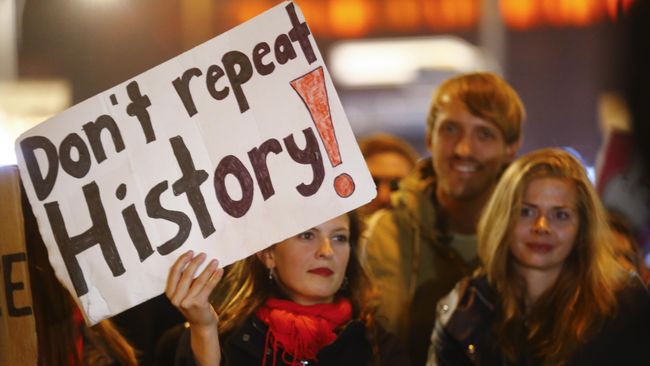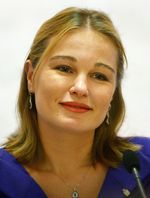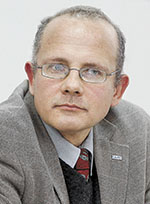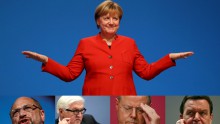On the eve of the parliamentary election in Germany, some observers described it as boring because of the predictability of the results. However, in fact, there were at least three surprises in this race.
Firstly, the leading CDU/CSU and SPD parties have suffered significant losses in this election. In particular, the Christian Democrats have received 33 percent of the vote, although forecasts had them at 38 percent. Moreover, the CDU/CSU bloc has lost almost eight percentage points in comparison with 2013. Despite this result, German Chancellor Angela Merkel said that her political force had achieved its strategic objectives in the parliamentary election. According to Merkel, the CDU/CSU will remain the largest political force in the parliament and has received a mandate from voters to form the new government. However, at the same time, the chancellor acknowledged that she had hoped the party would do better in this election.
The Social Democrats have received 20.5 percent, although they were forecast to get 23 percent, and this political force has lost almost five percentage points compared with the previous election. The SPD’s leader Martin Schulz announced the end of the “grand coalition” with the CDU/CSU, in which his party was a junior partner. “Cooperation with the CDU/CSU ends tonight,” said Schultz. At the same time, he expressed his desire to continue as the SDP’s leader.
Secondly, the biggest surprise for many has been the third position won by the rightwing populist party Alternative for Germany (AfD), which has won 13 percent of the vote and got into the German parliament for the first time. According to the Infratest-dimap public opinion polling institute, about 1.2 million people voted for the AfD who did not vote in the previous election. More than a million AfD votes came from voters who had traditionally voted for the CDU/CSU, about 470,000 had been SPD supporters, and about 400,000 had been supporters of the Left Party. The AfD enjoys highest support in eastern Germany, the territory of the former German Democratic Republic. Here, about 21.5 percent of the electorate voted for the party.

REUTERS photo
Thirdly, the Free Democratic Party and Alliance 90/The Greens did unexpectedly well, receiving respectively 10.7 and 8.9 percent of the vote. The Left Party cleared the five percent threshold as well, having received 9.2 percent.
The Free Democrats’ leader Christian Lindner said that with the return of his party to the Bundestag after a four-year break, “a freedom faction is present in the legislature again.” In the 2013 election, his party came 0.2 percent short of clearing the five percent threshold and entering the Bundestag.
Meanwhile, one of the Greens’ leaders, Anton Hofreiter, has not ruled out the participation of his party in the talks on the formation of the ruling coalition in the Bundestag of the next convocation. According to him, the CDU/CSU, despite the loss of votes in comparison with the previous election, is the winner of the election and accordingly gets to determine who to invite to the coalition.
It should also be noted that the turnout in the election was over 75 percent, rising from 71.5 percent observed in 2013.
Following the Social Democrats’ leader Schulz’s announcement of the party’s exit from the coalition and the transition of this political force to the opposition, it has become clear that the only way to form a workable cabinet led by the party of Merkel, who is set to become chancellor for the fourth time, is through creation of a coalition of the CDU/CSU, the Free Democratic Party, and Alliance 90/The Greens, which has already been christened the “Jamaica coalition” (from the colors of the coalition parties, which in this case coincide with the colors of the flag of Jamaica).
The Day asked Ukrainian and German experts to comment on the results of the German election and to tell us what Ukraine should expect from the new “Jamaica coalition” which is likely to be formed in the country.
“THE GOVERNMENT OF UKRAINE WILL HAVE TO PUT MUCH MORE WORK INTO THE GERMAN DIRECTION”
 Aliona HETMANCHUK, director of the Institute of World Policy:
Aliona HETMANCHUK, director of the Institute of World Policy:
“After the election results in Germany, the statement that Germany and Merkel are different becomes even more relevant for Ukraine. The fact that Merkel remains chancellor means that we will continue to have not just in Berlin, but also in the West in general a consistent and predictable partner, which does not apply, for example, to our transatlantic partner in the person of the US president, or, unfortunately, to our traditional Polish ally given its current government. That is, Germany will continue to maintain a ‘top-down’ approach to Ukraine, where the priority status of the Ukrainian issue and readiness to take into account the arguments of Ukraine will emanate first and foremost from the head of the government. This is unlike the US, where under both the previous and the present administrations, the ‘bottom-up’ approach has been more prominent, where the main promoters of the Ukrainian issue have been sitting outside the top office of the nation.
“If Merkel should be criticized at all over her actions regarding Ukraine, it is for an excessive focus on resolving the conflict in the Donbas, a kind of ‘Donbasization’ of her foreign policy on the Ukrainian direction, while other Ukraine-related issues, like reforms and fighting corruption, seemed to have faded into background. That is why, some say, Petro Poroshenko has seen her as a comfortable partner, as the main focus was on security, not anti-corruption or the rule of law. There is some truth to this observation, but this is not fully so. Merkel has been actively involved in discussing important transformations in Ukraine. The latest evidence of this is an attempt to launch a mechanism of special representatives for reforms in Ukraine under the G7’s auspices. Still, Germany probably means more for Ukraine than just a partner in the Normandy format talks. For example, every fifth euro coming here from the EU budget is of German origin. There is also an opportunity for the implementation of a new investment plan for Ukraine (the so-called new Marshall Plan), which was unlikely to get supported by the European People’s Party without the consent of Germany. The country is also a major donor of the reconstruction of the Donbas. Germany provides communication on Ukrainian issues with Emmanuel Macron’s France as well. By the way, this communication can be complicated if the Free Democrats, who are skeptical of Macron’s new financial proposals at the EU level, will influence the new German government. Germany matters on the Nord Stream 2. Germany, finally, is needed for future integration of Ukraine into NATO, it being the issue on which the two nations are still sharply divided.
“Obviously, with the new government and the new structure of the Bundestag, Merkel will need to put more effort into explaining why the chancellor’s office prioritizes Ukraine. It will be especially so if our government does not provide its German colleagues with worthy arguments as to how much German support is correlated with the pace of European transformation in Ukraine. After all, it is likely that counterarguments concerning Ukraine will not be lacking with such a powerful opposition, including both newly assertive Social Democrats, who will try to distance themselves from Merkel’s party, and supporters of the Russian narrative coming from the AfD. It is obvious that new trends in the Ukrainian direction are linked not only to the arrival of a new government and the departure of some friendly Bundestag members (like Marieluise Beck of the Greens), but also with the departure of Merkel’s foreign policy adviser Christoph Heusgen, who leaves to become ambassador to the UN, and his successor in this post will have to discover nuances and build trust with Ukrainian partners almost from a blank sheet.
“As for the new foreign minister, I would not particularly dramatize the role of the Ministry of Foreign Affairs, even if the leader of the Free Democrats Lindner will come to head it, who is notorious for his statement about ‘freezing’ the Crimea issue for the sake of having a dialog with the Kremlin on other issues. It is not assured that his pre-election attempt to position himself as a ‘new Hans-Dietrich Genscher’ will translate to government policy: the foreign policy line has been determined at the chancellor’s office for a long time. In any case, the government of Ukraine will have to put much more work into the German direction, and for this, first of all, it is necessary to substantially increase the quantitative and qualitative strength of the Ukrainian embassy in Berlin, restart and motivate the inter-parliamentary friendship group, clearly define at the government level the vision and priorities for a new investment plan for Ukraine. It should be noted that at the level of analytical centers of the two countries, a Ukrainian-German expert group has already been launched, whose inauguration meeting took place in June in Berlin, and already on November 7-8, experts from the two countries will gather in Kyiv to develop and advocate a shared vision of our relationship.”
“THESE ARE STRANGE RESULTS GIVEN A GOOD ECONOMIC SITUATION IN GERMANY”
 Andreas UMLAND, German political scientist:
Andreas UMLAND, German political scientist:
“The results differ significantly from public opinion polls. And in particular, Merkel’s party has lost more votes than expected. And this is against the backdrop of the fact that the Social Democrats also did poorly. And as I suspected, the rightwing populists have got more than they had been forecast to. Indeed, it looks like these are rather strange results against the backdrop of a good economic situation in Germany, which has even improved since the time when the grand black-and-red coalition came to power four years ago. And despite the good economic results and the activity of the Merkel government, both government parties have lost much of their support. And now there is a high probability that a new coalition may be possible, which can include the Christian Democrats and other coalition members.”
And what is the reason for the loss of votes by both parties against the backdrop of what you say are good economic results over the four years of this coalition’s term?
“I think it is definitely linked to the topic of refugees, which became an unjustifiably important one during the campaign. For example, the only debate between Martin Schulz, the main Social Democratic contender for the chancellor’s office, and Angela Merkel focused on the refugees, and it seems to me that the journalists were to blame for it. The issues of Islamist terrorism, national security, relations between Germany and Turkey were also related to it. Unfortunately, all these topics dominated this campaign, which affected the results of both the Social Democrats and the Christian Democrats.”
You said it was the journalists’ fault, can you explain in more detail what did you mean?
“For example, during the debate between Schulz and Merkel, more than half the time was devoted to the problem of refugees and related issues. And many criticized this, because there were other important issues to discuss. For example, for the German economy, a very important topic is the digitalization, the robotization of the economy and the unemployment issue arising in connection with the robotization of the economy. Important topics include also the prospective development of the EU and the relationship between Germany and the US, as well as the Russo-Ukrainian conflict. All these issues were made secondary or even tertiary. And the refugees issue pushed other issues into the background, and its prioritization helped the rightwing populist party Alternative for Germany first and foremost.”
It is believed that the Germans traditionally stand for stability, but in this case a great many voters supported this extremely rightwing party. Why did it happen so?
“This is evidence of a protest vote. We have always had rightwing radical electorate, but it was not gathered in one party before. It must be said that, on a wider European scale, this is still not such a high result compared to Austria, Hungary, and France. Such parties receive much more support in these countries than in Germany. Most likely, these 13 percent, which the Alternative for Germany will receive, is not such a high result on a wider European scale.”
Now many predict the creation of a black-yellow-green coalition, which has been christened the “Jamaica coalition,” because these colors coincide with those of the flag of that country. Will it be difficult to manage such a coalition?
“The fact that the Free Democrats and the Greens have won more than they were predicted by the polls raises the likelihood of a coalition which has been christened the Jamaica one. A coalition of three parties is a little harder to work with, although it will be easier to manage in some ways, since the overall result of both smaller parties is less than the result of the Social Democrats.”
And who, in your opinion, will become the Minister of Foreign Affairs, the vice-chancellor in this case?
“This ministry is the most prestigious government department and, most likely, it will go to a representative of the Free Democratic Party, one of them will take this post. And if the Free Democrats will not want to head the Ministry of Foreign Affairs, then this post may be taken by a representative of the Greens. And now the candidature for the post of the minister of foreign affairs is being discussed, with favored candidates being the chairman of that party Christian Lindner or his deputy Alexander Lambsdorf.”
How can this composition of the government influence Germany’s policy towards Ukraine and the implementation of the Minsk Agreements by Russia?
“I do not think that there will be any policy changes on that count, as these political parties share approaches to the Minsk process and the Russo-Ukrainian conflict. It can even be said that the ‘Jamaica coalition’ will probably take a tougher stance on these issues. If a Free Democrat becomes the minister of foreign affairs, he will be tougher on Russia. But in general, the difference will be small compared to the previous government.”
So, can we firmly expect that the new government will keep sanctions against Russia intact?
“Yes. Any softening of the sanctions will happen only in case of a significant improvement in the situation in the Donbas. There is no such position that all sanctions should be kept intact until the Donbas is liberated. The actual position is that some of the sanctions can be lifted if there is a real truce and some heavy weapons are withdrawn. In other words, the guiding idea now is that there will be gradual softening of sanctions, and not the preservation of the full sanction regime until the complete liberation of the Donbas.”
Do Germans consider the deployment of peacekeepers in the Donbas a realistic prospect, with their mandate going as far as taking control of that section of the Ukrainian-Russian border which our government does not control now?
“Here Germany supports the Ukrainian position, which boils down to the fact that there must be a heavily armed international mission and maybe even a temporary UN-appointed administration deployed throughout the now occupied parts of the Donbas. And the main thing is that the border between Ukraine and Russia should be placed under the control of such a mission. I am not sure that this can be achieved, because all this depends on Russia, which wields the veto power in the UN Security Council. Therefore, we will have to negotiate with the Kremlin. And that is the problem, but I would say that were it possible to form a UN mission so that it does not include Russian or pro-Russian troops, as well as Russian or pro-Russian commanders, then even a small UN mission would be in Ukraine’s interest. I say it because this would increase the presence of international organizations in the Donbas. And I think it would be a good thing, even if it was not a mission that Ukraine is envisioning now.”
What conclusions need to be drawn by Ukraine after the election in Germany, who we need to work with to promote our interests?
“Almost all Ukrainian parties gravitate for some unknown reason to the union of Christian Democratic parties, the European People’s Party (EPP). However, Ukrainian parties need to establish alliances with others, both in Germany and at the European level. It seems to me that this is the most important thing, I mean for parties like Self-Reliance and others to look for partners among Liberals, Greens or Social Democrats. This is a big drawback now, seeing that literally all your parties want to join the center-right EPP.
“The government of Ukraine needs to keep working like it did before. And here I do not see any problems. Ukrainian policy towards Germany was always quite reasonable. I think that working with the Alternative for Germany is not worth it. I know that there was already a meeting between the Ukrainian ambassador in Germany and representatives of the party in Berlin. But I think that it is just totally pointless. Because it is not only a pro-Russian party, I would even say that it is a pro-Putin party. For example, the party’s deputy chairman has said that Crimea historically belongs to Russia. Therefore, they fully support the Russian discourse and therefore it makes no sense to conduct a conversation with that party even after it entered the Bundestag.”








